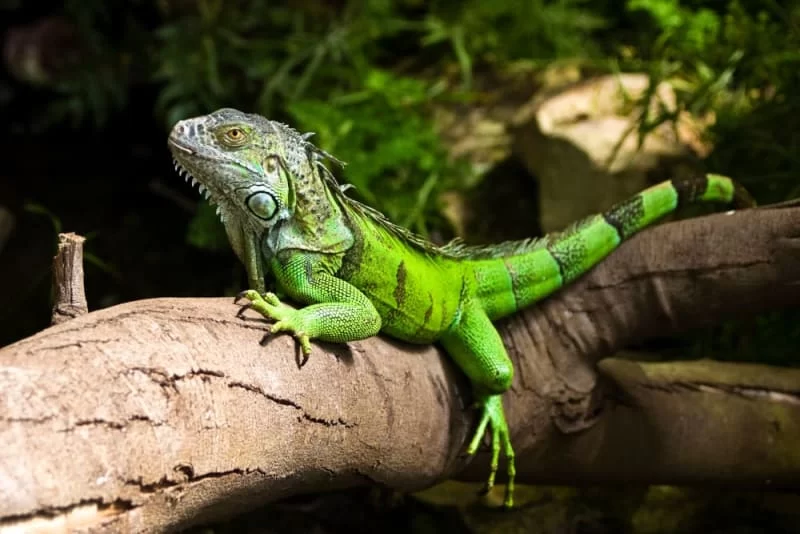- Creating a Healthy Habitat for Your Iguana
- Feeding and Nutrition for Pet Iguanas
- Essential Health Care Tips for Iguanas
- Understanding Iguana Behavior and Social Needs
- Common Challenges and Expert Solutions
- Getting Professional Support for Iguana Care
1. Creating a Healthy Habitat for Your Iguana
Proper habitat setup is the cornerstone of how to care for a pet iguana. Iguanas require spacious enclosures that replicate their natural environment to thrive. A minimum of 6 feet tall by 4 feet wide is recommended to accommodate their climbing habits and active lifestyle.
Temperature and humidity are critical. Iguanas need a basking area heated between 90-95°F and ambient temperatures around 75-85°F. Maintaining humidity levels between 70-80% mimics their tropical origins, preventing dehydration and shedding problems. Use heat lamps, UVB lighting, and misting systems to regulate these factors effectively.
Substrate and Furnishing Choices
Choose safe substrates such as reptile carpet, newspaper, or tile to avoid impaction risks. Include branches and shelves for climbing, as iguanas are arboreal by nature. Providing hiding spots and plants will help reduce stress and create a stimulating environment.
2. Feeding and Nutrition for Pet Iguanas
Diet is a vital part of iguana care, influencing their growth and longevity. Iguanas are primarily herbivores and need a diet rich in leafy greens, vegetables, and occasional fruits. Collard greens, mustard greens, and dandelion leaves offer essential calcium and vitamins.
Avoid feeding animal protein or high-oxalate foods such as spinach and rhubarb, which can interfere with calcium absorption. A balanced calcium to phosphorus ratio is crucial to prevent metabolic bone disease, a common ailment in captive iguanas.
Supplementation and Feeding Frequency
Use calcium and vitamin D3 supplements under guidance to support healthy bone development. Feed juvenile iguanas daily and reduce frequency to every other day as they mature. Fresh, clean water should always be available to maintain hydration.
3. Essential Health Care Tips for Iguanas
Regular monitoring of your iguana’s health is a key part of how to care for a pet iguana successfully. Watch for signs of illness such as lethargy, loss of appetite, abnormal feces, or changes in skin color.
Routine veterinary check-ups with a reptile-savvy vet help catch problems early. Hidden Brook Veterinary provides specialized care, including parasite screening, nutritional counseling, and injury treatment tailored for iguanas.
Preventing Common Diseases
Metabolic bone disease, respiratory infections, and parasites are frequent issues. Prevent them with proper UVB lighting, clean enclosures, and balanced nutrition. Quarantining new iguanas before introducing them to an existing habitat also reduces disease risks.
4. Understanding Iguana Behavior and Social Needs
Iguanas are territorial and can display aggression if stressed or mishandled. Learning how to interpret their body language—such as head bobbing or tail whipping—helps in managing interactions safely.
Providing enrichment like climbing opportunities and occasional supervised outdoor time improves mental health. While iguanas are generally solitary, some may tolerate gentle handling and bonding over time.
5. Common Challenges and Expert Solutions
Many iguana owners face challenges like shedding difficulties, appetite loss, or aggressive behavior. These often stem from inadequate habitat conditions or diet imbalances.
Adjusting humidity, ensuring consistent heat cycles, and consulting with reptile experts can resolve these problems effectively. For example, misting the enclosure during shedding or offering favored foods can stimulate appetite.
6. Getting Professional Support for Iguana Care
Expert guidance makes a significant difference in how to care for a pet iguana properly. Hidden Brook Veterinary offers tailored advice, health monitoring, and premium products designed for iguana wellbeing.
Their team understands the nuances of reptile care and can assist with everything from habitat design to disease prevention, ensuring your pet iguana lives a healthy, happy life.












